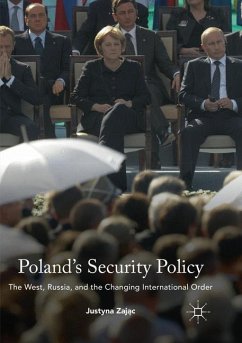
Strategy-Making in the EU
From Foreign and Security Policy to External Action
Versandkostenfrei!
Versandfertig in 6-10 Tagen
53,99 €
inkl. MwSt.
Weitere Ausgaben:

PAYBACK Punkte
27 °P sammeln!
This book provides a detailed analysis of the policy-making processes of EU strategies in foreign and security policy and external action. It uses the European Security Strategy and the EU Global Strategy to assess their policy-making dynamics both before and after the Lisbon Treaty. Inter-institutional relations in strategy-making are put into the context of current debates in European integration, questioning the assumption that the EU is a body increasingly ruled by intergovernmentalism - as reflected by the new intergovernmentalism literature. The book also provides a categorisation of EU ...
This book provides a detailed analysis of the policy-making processes of EU strategies in foreign and security policy and external action. It uses the European Security Strategy and the EU Global Strategy to assess their policy-making dynamics both before and after the Lisbon Treaty. Inter-institutional relations in strategy-making are put into the context of current debates in European integration, questioning the assumption that the EU is a body increasingly ruled by intergovernmentalism - as reflected by the new intergovernmentalism literature. The book also provides a categorisation of EU strategies and considers them as policy-inspiration documents, acting as frameworks for policy-making. This reading of strategies lies behind the analysis of the policy-making processes of the ESS and the EUGS, unpacked into four phases: agenda-setting, policy formulation, policy output and implementation. By looking at the shifting policy-making dynamics from foreign and security policy to external action, the author sheds light on the current shape of EU integration.














